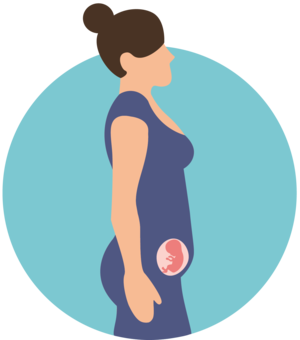Pregnancy at week 18
4-minute read
Your baby
Your baby weighs about 200g and has grown to about 14cm – about the length of a $20 note. They have eyebrows, hair and fingernails.
The baby can yawn and hiccup. Their nervous system is developing and a layer of myelin is growing to cover their nerve cells. Their bowel is filling with meconium, which will become their first poos.
Your baby is moving around a lot by now. You might notice this as little 'bubbles' or 'flutters' in your stomach, and it's known as the ‘quickening’. The baby will probably rest at times when you are active, so you’re more likely to feel them when you’re lying still at night.
If you can’t feel your baby’s movements yet, don’t worry – you might not feel anything for another couple of weeks.
Your baby at 18 weeks
| Length: | 14cm |
| Weight: | 200g |

Your body
By 18 weeks, many women are starting to feel light-headed and dizzy. This is because the growing uterus can push against an artery when you’re sitting or lying down. When you stand up, there’s a rush of blood which makes your head spin.
Your body is making more blood to nourish your baby, so you’ll need to drink plenty of fluids to support the process.
You may notice that you’re starting to gain weight now. If you were in the healthy weight range before you fell pregnant, you should aim to gain about 1.5 to 2 kg each month from now until you give birth. You don’t need to eat a lot more food, but do make sure you have a healthy diet so that you and your baby get the nutrition you need.
Things to remember
Between 18 and 20 weeks, you will have an ultrasound to check your baby’s development. This is called a fetal anomaly or morphology scan. It checks the size of the baby and measures physical features including the heart, brain, spine and kidneys.
At this scan you may be able to find out (if you want to) whether you’re having a boy or a girl. If the scan shows there might be problems with the baby’s development, you may be referred to an obstetrician or genetic counsellor for more tests.
Read next

Your pregnancy at 19 weeks
Learn about your pregnancy journey and what is happening to you and your baby.

Speak to a maternal child health nurse
Call Pregnancy, Birth and Baby to speak to a maternal child health nurse on 1800 882 436 or video call. Available 7am to midnight (AET), 7 days a week.
Learn more here about the development and quality assurance of healthdirect content.
Last reviewed: April 2022




